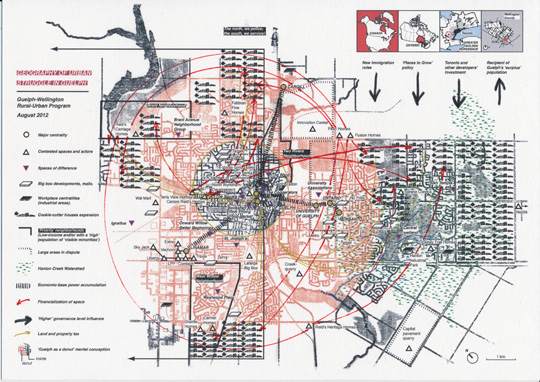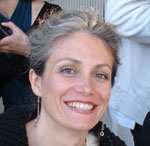
July 15 - 17, 2014
10AM - 4PM
At multiple sites at the University of Toronto Mississauga (UTM) campus
Presented in the context of Comfort Zones, a research-creation project curated by Yan Wu in collaboration with the Blackwood Gallery
This research project is being produced as part of the requirements for the MVS degree in Curatorial Studies at the University of Toronto and supported in part by the Department of Visual Studies (UTM) through the Graduate Expansion Fund.
.

Email blackwood.gallery@utoronto.ca by Wednesday June 25 at 5pm.
Spaces are limited. Current graduate and undergraduate students, recent grads, faculty, researchers, administrators, service workers, artists, architects, curators, and designers are encouraged to participate. Current graduate students will be given priority.
FREE
*St. George/UTM shuttle bus, lunch, and refreshments will be provided.
Can the University of Toronto Mississauga (UTM) campus be studied like a city? What might be revealed from a spatial, social and cultural analysis? What tools can be used to detect places of comfort and conflict, necessity and aspiration, on a commuter campus shared by diverse users including students, researchers, professors, administrative staff, campus police, facilities and management planning staff, and temporary visitors? Such questions will be addressed in Radicalizing the Campus, a participatory workshop designed as an exercise on the use of space.
The workshop will be led by Lucia Babina and Miguel Robles-Durán, co-founders of Cohabitation Strategies, a non-profit cooperative for socio-spatial research, design, and development based in New York City, Rotterdam, and Ibiza. Cohabitation Strategies situates its actions and research inside the conditions of urban decline, inequality, and segregation within the contemporary city. It functions as a collaborative international platform which seeks an understanding of urban dynamics at macro and micro scales through scientific and action research towards the improvement of urban life. The aim is to foresee latent potentials that can stimulate alternative cohabitation models, social relations, and collective uses.
Cohabitation Strategies’ research methodologies will be applied to the UTM campus, a flexible community in constant class contradiction. The workshop aims to study and re-define shared sites on the UTM campus and to challenge their various uses as potential collective spaces for public engagement and knowledge production.
The workshop will introduce participants to applied radical urban theory from Lefebvre to Harvey, as well as Cohabitation Strategies’ unitary urban theory, methodology, and transdisciplinary practice. The workshop will include guided tours of the campus, participatory action research, roundtable discussions, and mapping exercises. Participants will:
- develop capacities for understanding urban processes from a theoretical point of view;
- build useful relational tools for social inclusion;
- test abilities for perceiving space as an opportunity for social engagement
In advance of the workshop, participants will be asked to read a brief list of materials prepared by Cohabitation Strategies which will be discussed in the workshop. Workshop details and materials will be circulated upon confirmation of registration.
Curatorial research notes are shared at: http://utmcomfortzone.tumblr.com/.
Cohabitation Strategies (CohStra) is a non-profit cooperative for socio-spatial research, design, and development based in New York City, Rotterdam, and Ibiza. CohStra was founded in the city of Rotterdam – right after the 2008 financial crash – by Lucia Babina, Emiliano Gandolfi, Gabriela Rendón and Miguel Robles-Durán. Since then, CohStra has initiated operation centers in various cities across Europe, South, and North America. Its action research endeavors to facilitate transformative and progressive urban intervention projects. This is undertaken through the active engagement with a range of locally embedded actors from governments, municipalities, cultural institutions, non-profit organizations, and civic groups to researchers, artists, designers, and independent activists that coalesce around the desire for social, spatial, and environmental justice – in short, the Right to the City.
For more information on what they do, visit: www.cohstra.org.

Lucia Babina is a cultural activist whose focus is on research and reactivation of sustainable ways of cohabitation and coexistence. Her aim is to reflect on the current global unevenness and injustice by means of collective and artistic processes. She is co-founder of Cohabitation Strategies. She is also co-founder of iStrike and iStrike.ultd in Rotterdam, an environmental organization aimed at creating multidisciplinary platforms of analysis, comparison, and international exchange. With iStrike and Strike.ultd she co-produced projects such as: Ars&Urbis International Workshop (Douala, Cameroon, 2007), Salon Urbain de Douala (Douala, Cameroon, 2007), Moving in Free Zones #1 and 2 (Rotterdam, The Netherlands, 2007 and 2009), Talking About! (Rotterdam, The Netherlands, 2009). She is co-author of The Cook, the Farmer, His Wife and Their Neighbour as part of Stedelijk Goes West (Amsterdam, The Netherlands, 2009); Market Academy Naschmarkt as part of Wiener Festwochen (Vienna, Austria, 2010); TheBrantClub as part of Musagetes’ Guelph Program (Guelph, Canada, 2012). Babina has been giving lectures and writing contributions for several international platforms.

Miguel Robles-Durán, an urbanist, is Director of the Urban Ecologies graduate program at the New School/Parsons in New York City, and Senior fellow at “Civic City”, a post-graduate design/research program based in HEAD - Geneva, Switzerland. Robles-Durán has wide international experience in the strategic definition/coordination of trans-disciplinary urban projects, as well as in the development of tactical design strategies and civic engagement platforms that confront the contradictions of contemporary urbanization. He recently co-edited/authored the book Urban Asymmetries: Studies and Projects on Neoliberal Urbanization that reviews the dire consequences that neoliberal urban policies have had upon the city and discusses possible alternatives to market-driven development. Robles-Durán’s areas of specialization are design/research interventions and strategies in uneven urbanization and areas of social urban conflict, urban political-economy, and urban theory.
Comfort Zones is a curatorial proposition conceived by Yan Wu. Strategically, it skips over the conventional presentation of an exhibition and replaces it with a year-long interdisciplinary, participatory, and experimental research program designed to study the complexities and possibilities of commissioning public art in a university context, from the selection of the site to the consideration of the work’s publicity, to the potential for public art to re-generate a collective ethos that has faded into the haze of Neoliberalism. The project explores three lines of inquiry: 1) What is a comfort zone: a physical site, a state of mind, a mode of operation, or a combination of all of the above? 2) How are comfort zones configured in an institutionalized environment such as a university and how are they shared among distinct user groups with different interests, privileges, and access? 3) Can new comfort zones be activated on campus through informal learning and collective knowledge production?
Cohabitation Strategies has been invited to respond to this curatorial proposition and commissioned to design the research methodologies and public interface of this year-long project at UTM. Cohabitation Strategies will translate the spatial discoveries of the workshop into a series of maps of comfort zones at UTM. The maps will inform the staging of a public event at a selected site on the UTM campus in spring 2015.
Curatorial research notes are shared at: http://utmcomfortzone.tumblr.com/.
Formerly trained as a computer programmer, Yan Wu is a Shanghai-born and Toronto-based curator. Her practice contemplates the interplay of public art, architecture, and urban design. She has collaborated with arts organizations including Gendai Gallery, Art Metropole, Justina M. Barnicke Gallery, and Gallery 101. In 2012, she initiated and curated a year-long spatial and institutional experiment titled Gendai Workstation with a team of like-minded interdisciplinary collaborators. The project received a special jury award at the 25th Images Festival, and subsequently dissolved and transformed itself into an on-going landscape of mobile organization strategies: a moveable unit of modular furniture, a tote bag, and a library that privileges relations to book titles. She recently co-curated the Canada Pavilion with Janine Marchessault at the 5th Bi-city Urbanism/Architecture Biennale in Shenzhen China. Currently, Wu is an MVS candidate in Curatorial Studies at Daniels Faculty of Architecture, Landscape & Design at the University of Toronto.